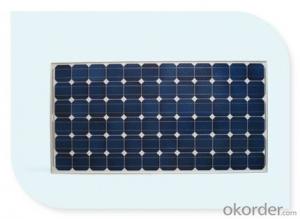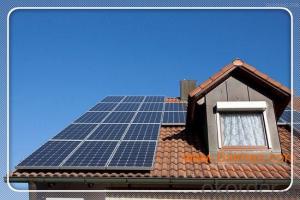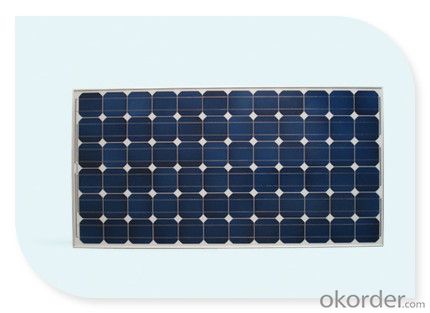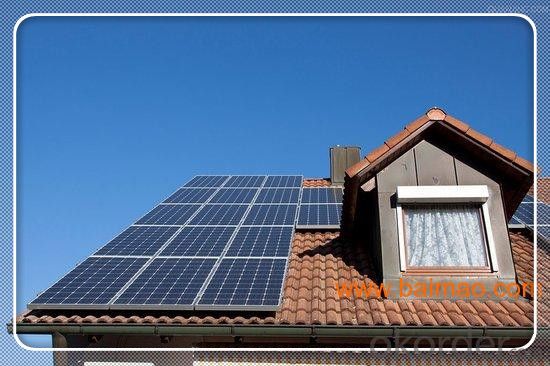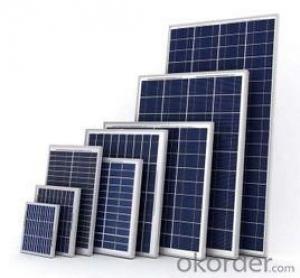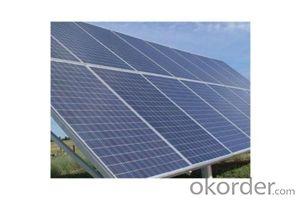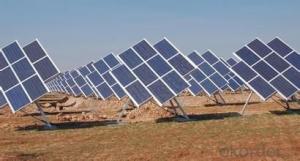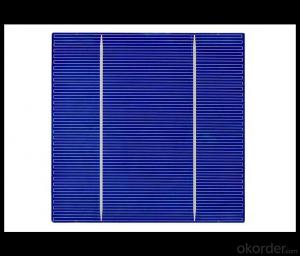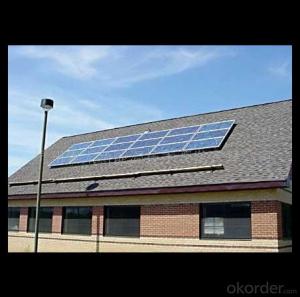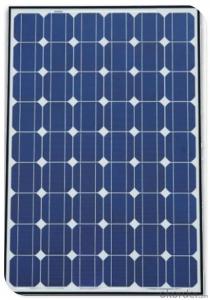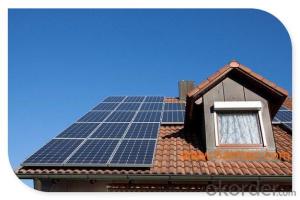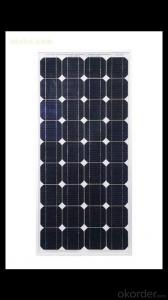280w Direct Factory Sale Price 260-300watt Solar Panels Legal in Florida
- Loading Port:
- China main port
- Payment Terms:
- TT OR LC
- Min Order Qty:
- 10000 watt
- Supply Capability:
- 100000 watt/month
OKorder Service Pledge
OKorder Financial Service
You Might Also Like
Specification
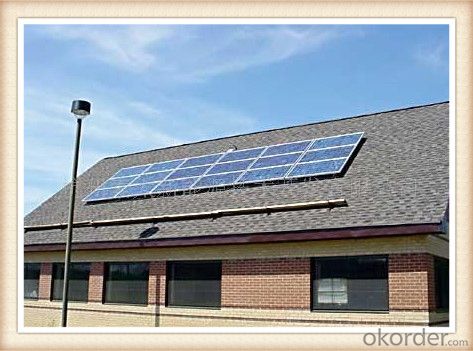
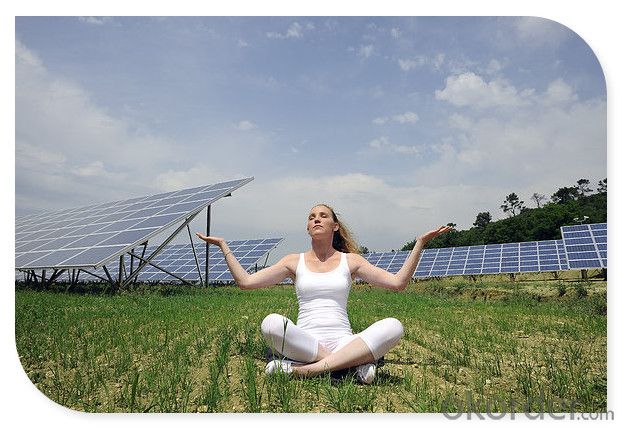
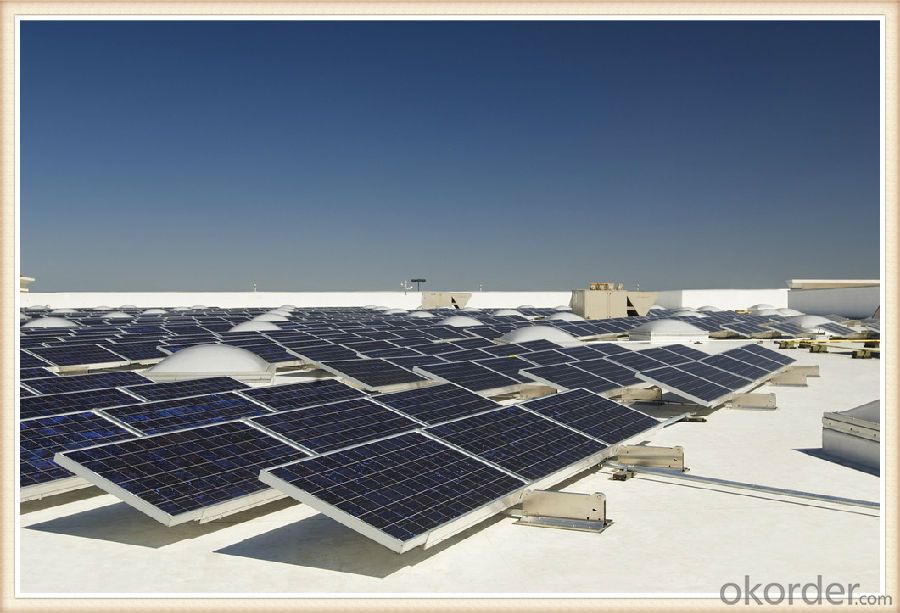
Solar Module Introduction
Solar modules use light energy (photons) from the sun to generate electricity through the photovoltaic effect. The majority of modules use wafer-based crystalline silicon cells or thin-film cells based on cadmium telluride or silicon. The structural (load carrying) member of a module can either be the top layer or the back layer. Cells must also be protected from mechanical damage and moisture. Most solar modules are rigid, but semi-flexible ones are available, based on thin-film cells. These early solar modules were first used in space in 1958.
Electrical connections are made in series to achieve a desired output voltage and/or in parallel to provide a desired current capability. The conducting wires that take the current off the modules may contain silver, copper or other non-magnetic conductive transition metals. The cells must be connected electrically to one another and to the rest of the system. Externally, popular terrestrial usage photovoltaic modules use MC3 (older) or MC4 connectors to facilitate easy weatherproof connections to the rest of the system.
Specification
Model Type | |
Peak Power-Pmax(W) | 5-200W |
Open Circuit Voltage-Voc(V) | 44.2 |
Maximum Power Voltage-Vmp(V) | 36 |
Short Circuit Current-Isc(A) | 5.4 |
Maximum Power Current-Imp(A) | 5 |
Maximum System Voltage | 1000V DC |
Maximum Series Fuse Rating | 10A |
Power Tolerance | -1~+3% |
Temperature Coefficients of Pmax | -0.45%/℃ |
Temperature Coefficients of Voc | -0.348%/℃ |
Temperature Coefficients of Isc | 0.031%/℃ |
Nominal Operating Cell Temperature | 44.5±2℃ |
Standard Testing Condition(STC) | Irradiance:1000W/m²;Temperature:25℃;AM=1.5 |
Qualification Test Parameters | |
Operating Temperature | -40℃~+85℃ |
Storage Temperature | -40℃~+85℃ |
Pressure Bearing | ≥5400Pascal/m² |
Wind Bearing | ≥5400Pascal/m² |
Mechanical Characteristics | |
Cell Size | Mono 125*125mm±0.5 |
No.of Cells | 72pcs(6*12) |
Dimension | 1580*808*40mm |
Weight | 15.5Kg |
Glass | 3.2mm High Transmission,Low Iron |
Frame | Anodized Aluminum Alloy |
Junction Box | IP65Rated |
Internal Diodes | 3 Bypass Diodes |
Cable | 1*4.0mm² Length 900mm |
Images
Packing & Shipping:
We have rich experience on how to pack the panels to make sure the safety on shipment when it arrives at the destination.
The normal size is packed by 25pcs/ carton / pallet. Paper carton for FCL shipping and wood carton for LCL shipping.
Features
1.High reliability with guaranteed -3% to +5% power output tolerance, ensuring return on investment
2.High conversion efficiency based on leading innovative photovoltaic technologies
3.Withstands high wind-pressure and snow load, and extreme temperature variations
4.Attractive appearanceUnique frame design, high mechanical strength, and easy Installation
Warranty:
For c-Si panel: 25years output warranty for no less than 80% of performance, 10 years output warranty for no less than 90% of performance. Free from material and workmanship defects within 5 years.
For a-Si panel: 20 years output warranty for no less than 80% of performance, 10 years output warranty for no less than 90% of performance. Free from material and workmanship defects within 2 years.
•100% product quality protection
•100% on-time shipment protection
•100% payment protection for your covered amount
FAQ:
(1)What price for each watt?
It depends on the quantity, delivery date and payment terms.
(2)What is your size for each module? Can you tell me the Parameter of your module?
We have different series of panels in different output, both c-Si and a-Si. Please take the specification sheet for your reference.
(3)Can you provide the peripheral products of the solar panels, such as the battery, controller, and inverter? If so, can you tell me how do they match each other?
Actually we are only manufacturer of solar panels, but we could try to source them for you in China if you need. We could provide you an optimal system design to instruct you how to install.
(4)Do you have the CE, TUV, UL Certification?
We’ve already passed all the tests, and any certificate is available.
(5)Have you ever sold your products to companies in my country?
Of course, we have customers in all general PV markets, but I think we should expand our market share along with the market growth.
(6)When did your company set up? You are a new company, how can I believe your quality?
We entered into Solar PV industry in 2005, now we have several plants in manufacturing of a-Si and c-Si panels, and our capacity is 220MW per year. Till now we have already passed all the tests by authorized laboratories, e.g. TUV, VDE, UL.
(7)Can you help us install the module if we cooperate with you?
We haven’t entered into installation sector, but we have the plan in near future.
(8) How do you pack your products?
We have rich experience on how to pack the panels to make sure the safety on shipment when it arrives at the destination.
(9) Can you do OEM for us?
Yes, we can.
(10)Can we visit your factory?
Surely, I will arrange the trip basing on your business schedule.
- Q: Can solar panels be used in deserts?
- Yes, solar panels can definitely be used in deserts. In fact, deserts are considered ideal locations for solar power generation due to their high solar irradiance and vast open spaces. The availability of ample sunlight allows solar panels to efficiently convert sunlight into electricity. Additionally, deserts often have less cloud cover and atmospheric interference, resulting in more consistent and predictable solar energy production.
- Q: What is the average size of a residential solar panel system?
- The average size of a residential solar panel system is typically between 5 to 10 kilowatts (kW), depending on the energy needs and available rooftop space of the home.
- Q: I want to build a solar panel
- Some people that have advanced technical skills can even try to build their own solar panels to save money. In case you decide to go with this option you should know that today is fairly easy to find lot of literature about building your own solar panels which of course makes things easier. Still I would recommend this option to people without advanced technical skills. renewableenergyarticles.blogspot....
- Q: Can solar panels be used to power a telecommunications network?
- Yes, solar panels can be used to power a telecommunications network. Solar power is a sustainable and renewable energy source that can be harnessed to generate electricity for various applications, including powering telecommunication infrastructure. By installing solar panels, the telecommunications network can operate with minimal reliance on the grid, reducing energy costs and environmental impact. Additionally, solar power can be stored in batteries to ensure uninterrupted power supply even during periods of low sunlight.
- Q: Do solar panels require regular inspections?
- Yes, solar panels do require regular inspections to ensure optimal performance and identify any potential issues such as damage, debris, or faulty connections. Regular inspections can help in maintaining the efficiency and longevity of the solar panels.
- Q: Are there any fire hazards associated with solar panels?
- Yes, while solar panels themselves do not pose a significant fire hazard, there are some potential fire risks associated with their installation and operation. These risks primarily stem from electrical malfunctions, such as faulty wiring, improper installation, or damage to the electrical components. Additionally, in rare cases, solar panels can contribute to the spread of fire by acting as a source of fuel or by hindering firefighting efforts due to their presence on rooftops. However, with proper installation, regular maintenance, and adherence to safety guidelines, the fire hazards associated with solar panels can be minimized.
- Q: We are looking in to buy solar panels for our house. The payment has to be around or under $4000. Our house is a 4 bedroom and 3 bath 2-story house. (Around 2500 sq. ft.) Where can we get the solar panels? Also: Will it heat our water? When we get the solar panels, what direction do they have to be facing?
- Where can we get the solar panels? I think you will have to buy it on OKorder Solar Panels can be used to heat water and heaters. When you get the solar panels, they should be in the direction that the sun rises in your country. They should be allowed to come into direct contact with sunlight for most of the day in order for the solar panels to be used to its max.
- Q: i need to cut down on electricity bills, and so i was wondering if someone could give me step-by-step instructions, or websites that have step-by-step instructions on how to build an electricity generating solar panel.
- electric powered panels are actually not plausible for many persons. they are 2 great skinny layers of polarized cloth. while the solar hits them electrons pass from the st to the 2d layer with an quantity of stress. you are able to no longer reproduction that at abode. What you need to do is setup photograph voltaic heating panels and run them against a Stirling engine. this methodology is many times extra effective than time-honored electric powered panels besides in industry. they have warmth on one element and chilly on the different to generate stress. Hook that to any generator to offer electrical energy. in case you're useful construction a house gadget, weblog approximately it, others will desire to nicely known precisely the way you probably did it.
- Q: i am very much interested in making a solar panel, my problem is where i can acquire the main components in order to build it, i am staying here in abu dhabi UAE i'm always searching on the internet for shops that can provide me a DIY kit but i did not find one, i need somebody who knows where i can get these things, please let me know.
- I okorder
- Q: Can solar panels be used in areas with high levels of bird or bat activity?
- Yes, solar panels can be used in areas with high levels of bird or bat activity. However, it is important to take certain precautions to minimize the potential risks to birds and bats. These precautions may include using specific panel designs that reduce the chances of bird or bat collisions, implementing bird or bat deterrent measures, and considering the placement of the panels in areas away from known flight paths or nesting sites. By implementing these measures, solar panels can coexist with bird and bat populations while helping to generate clean, renewable energy.
Send your message to us
280w Direct Factory Sale Price 260-300watt Solar Panels Legal in Florida
- Loading Port:
- China main port
- Payment Terms:
- TT OR LC
- Min Order Qty:
- 10000 watt
- Supply Capability:
- 100000 watt/month
OKorder Service Pledge
OKorder Financial Service
Similar products
Hot products
Hot Searches
Related keywords
